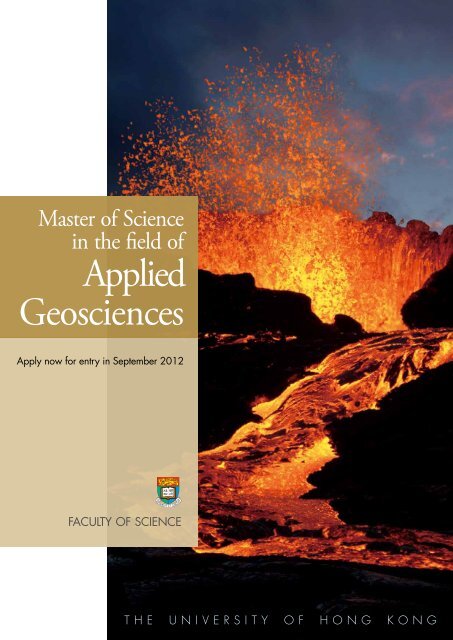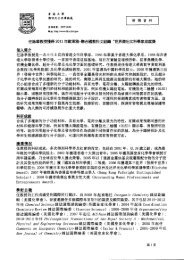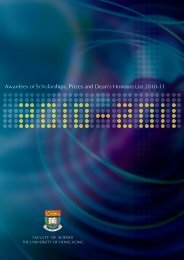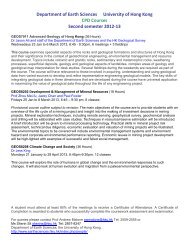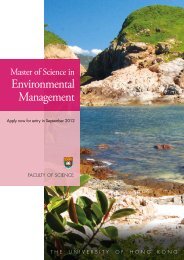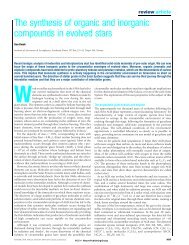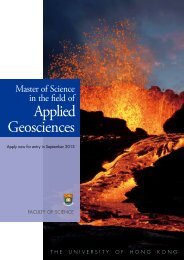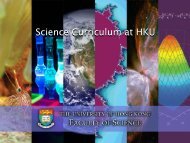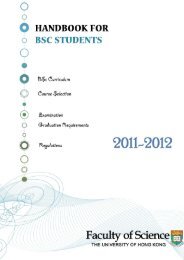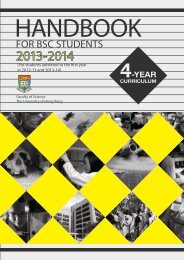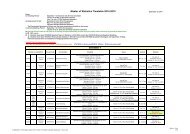Applied Geosciences - Faculty of Science, HKU - The University of ...
Applied Geosciences - Faculty of Science, HKU - The University of ...
Applied Geosciences - Faculty of Science, HKU - The University of ...
Create successful ePaper yourself
Turn your PDF publications into a flip-book with our unique Google optimized e-Paper software.
Master <strong>of</strong> <strong>Science</strong>in the field <strong>of</strong><strong>Applied</strong><strong>Geosciences</strong>Apply now for entry in September 2012FACULTY OF SCIENCE<strong>The</strong> <strong>University</strong> <strong>of</strong> Hong Kong
GEOS7021 Geological fieldwork i (3 credits)GEOS8002 Pr<strong>of</strong>essional practice in applied geosciences (3 credits)GEOS8003 Seminars on unforeseen ground conditions,geotechnical and environmental failures (3 credits)GEOS8020 Project II (9 credits)* Graduates in Earth <strong>Science</strong>s cannot take this course as a core course. <strong>The</strong>y cantake another 6 credits from elective course(s) in its place.Other Elective CoursesGEOS7004 Earth science and environmental management (3 credits)GEOS7027 Earth systems (6 credits)GEOS8201 <strong>Applied</strong> geochemistry (3 credits)GEOS8202 Development and management <strong>of</strong> mineral resources (3credits)GEOS8213 Global tectonics (6 credits)ENVM7012 Environmental economics and analysis (3 credits)ENVM7013 Sustainability, society and environmental management (3credits)ENVM7016 Environmental policy (3 credits)ENVM7017 Environmental law in Hong Kong (3 credits)ENVM8006 Environmental impact assessment (3 credits)ENVM8011 Environmental auditing and reporting (3 credits)ENVM8012 Environmental health and risk assessment (3 credits)Certain courses not included in the list above may be accepted as alternativeelectives at the discretion <strong>of</strong> the programme director. Timetabling <strong>of</strong> coursesmay limit availability <strong>of</strong> some elective courses.Description <strong>of</strong> Selected Courses (Provisional)GEOS7004Earth science and environmental management(3 credits)Course coordinator and teacher: Dr GC Zhao<strong>The</strong> course examines major issues <strong>of</strong> earth science <strong>of</strong> relevance to environmentalmanagement. Case studies relevant to coastal cities will be presented. Topicsinclude chemical composition <strong>of</strong> earth materials, geochemical surveys for pollutionmonitoring, geology and human health, environmental change in the QuaternaryPeriod, fluvial and coastal processes and management, environmental impact <strong>of</strong>mining and dredging, geological aspects <strong>of</strong> land use planning, water resourcemanagement and waste disposal.GEOS7010Geology principles and practice(6 credits)Course coordinator: Pr<strong>of</strong>essor MF ZhouA review <strong>of</strong> fundamental concepts in geoscience, including earth and geologicalprocesses, surface processes, minerals and rocks, geological structures andgeological map interpretation. <strong>The</strong> course also introduces the rocks and geologicalformations <strong>of</strong> Hong Kong.GEOS7011Advanced geology <strong>of</strong> Hong Kong (6 credits)Course coordinator: Pr<strong>of</strong>essor LS ChanThis advanced course examines specialist aspects <strong>of</strong> the rocks and geologicalformations and structures <strong>of</strong> Hong Kong and their significance in the context <strong>of</strong>geotechnical engineering, environmental management and resource development.Topics include volcanic and granitic rocks, sedimentary and metamorphic rocks,weathering processes, superficial deposits, geology and geological aspects <strong>of</strong>landslides.GEOS7012 Site investigation and engineering geologicaltechniques (6 credits)Course coordinator: Pr<strong>of</strong>essor Andrew Malone (taught by Pr<strong>of</strong>essorMalone, Ir Philip Chung and Ms HY Ho)A pr<strong>of</strong>essional course on the concepts and skills used in geotechnical siteinvestigation. Topics include the design <strong>of</strong> site investigations, desk study andwalkover survey, aerial photographic interpretation, soil and rock description andclassification, ground investigation technology and soil and rock laboratory testing.GEOS7015 Rock mechanics (3 credits)Course coordinator: Pr<strong>of</strong>essor Andrew Malone (taught by Dr Mark Chan)<strong>The</strong> course introduces the basic concepts <strong>of</strong> rock mechanics used in geotechnicalpractice. Topics include index properties, strength and deformability <strong>of</strong> intactrock; distribution and measurement <strong>of</strong> in-situ stresses; and shear strength <strong>of</strong>discontinuities in rock masses.GEOS7016 Soil mechanics (3 credits)Course coordinator: Pr<strong>of</strong>essor Andrew Malone (taught by Ir Philip Chungor Dr Albert Yeung)An examination <strong>of</strong> the basic soil mechanics theory used in geotechnical practice.<strong>The</strong> course reviews phase relationships, soil classification, compaction, fluid flow andeffective stress concepts; and provides a more detailed analysis <strong>of</strong> elasticity, shearstrength and consolidation.GEOS7020 Project I (3 credits)Course coordinator: Pr<strong>of</strong>essor Andrew Malone<strong>The</strong> first phase <strong>of</strong> an independent study <strong>of</strong> a problem in applied geosciences. Itinvolves literature review, data collection and data analysis. Students are requiredto write an inception report and give a presentation on their proposed study. Workis required on the project during the summer following the second semester.Pr<strong>of</strong>essional geologists are expected to undertake a field mapping task as part<strong>of</strong> their project.
GEOS7021 Geological fieldwork I (3 credits)Course coordinator: Pr<strong>of</strong>essor LS ChanSelf-directed study in the field over a 12-month periodleading to the production <strong>of</strong> maps, field sheets, narrativeaccounts and other geological records for assessment.<strong>The</strong> fieldwork may be undertaken in association withthe excursions <strong>of</strong> the Department <strong>of</strong> Earth <strong>Science</strong>s,the local learned societies or independently. (Markedon a pass/fail basis.)GEOS7023 Geology for geotourism(6 credits)Course coordinator: Pr<strong>of</strong>essor LS ChanThis will be a joint course with GEOS7010 GeologyPrinciples and Practice (6 credits).GEOS7024 Management (3 credits)Course coordinator: Pr<strong>of</strong>essor Andrew Malone(taught by Ir Ambrose Kwong and Dr CK Lau)This subject will cover most <strong>of</strong> the following. Engineeringprocesses, programming and procurement strategies:project framework, common methods for obtaininginvestigation, design and construction services andproject programming. Contract management: Engineer’sand contractor’s site organisation, common forms <strong>of</strong>contract, specifications, methods <strong>of</strong> measurement,quantities and cost estimation, variations and claims,approaches to dispute resolution. Construction sitesafety, health and environmental aspects: Relevantregulations, environmental impacts <strong>of</strong> works andmitigation strategies. Quality control and qualityassurance.GEOS7027 Earth systems (6 credits)Course Coordinator and teacher: Pr<strong>of</strong>essor JGMalpasTo provide an appreciation <strong>of</strong> the Earth System and theinterfaces between its component parts, in order thatstudents might appreciate how informed decisions canbe made on the future exploitation and preservation <strong>of</strong>the planet. To provide a forum for discussion <strong>of</strong> globalissues facing earth scientists.GEOS8001 Hydrogeology (3 credits)Course coordinator and teacher: Dr J JiaoTo study the role <strong>of</strong> sub-surface water in engineeringand environmental applications. Topics include thehydrologic cycle, properties <strong>of</strong> aquifers controllingthe transmissivity, storage and quality <strong>of</strong> groundwater,quantification <strong>of</strong> groundwater flow, the fieldinvestigation <strong>of</strong> groundwater and assessment <strong>of</strong>field parameters and applications <strong>of</strong> hydrogeology inengineering and environmental studies.GEOS8002 Pr<strong>of</strong>essional practice in appliedgeosciences (3 credits)Course coordinator: Pr<strong>of</strong>essor Andrew Malone(taught by Pr<strong>of</strong>essor Malone, HF Leung LLB andBevis Mak)An examination <strong>of</strong> issues in pr<strong>of</strong>essional practice inapplied geoscience; including regulation <strong>of</strong> practice,pr<strong>of</strong>essional ethics and law contracts and risk and safetymanagement.GEOS8003 Seminars on unforeseen groundconditions, geotechnical andenvironmental failures (3 credits)Course coordinator: Pr<strong>of</strong>essor Andrew Malone(instructors Pr<strong>of</strong>essor Malone, Ir Ken Ho andDr J Jiao)A series <strong>of</strong> student-led seminars on case histories <strong>of</strong>landslides, collapses <strong>of</strong> engineering structures, excessivesettlement and environmental disasters. Presentations<strong>of</strong> facts and opinions are given by students based onsuggested reading material. Some <strong>of</strong> the seminars arefacilitated by the experts who were involved in the case.GEOS8005 Field testing and instrumentationin engineering geology (3 credits)Course coordinator: Pr<strong>of</strong>essor LS Chan (taughtby Pr<strong>of</strong>essor LS Chan and Dr Cyril Chan)<strong>The</strong> course introduces several commonly usedgeophysical methods and in-situ testing techniques,including penetration tests, seismic cones, landgeophysical surveys such as seismic refraction,microgravity, magnetic and conductivity surveys,ground penetrating radar, electrical imaging anddownhole geophysical logging, and marine geophysicssuch as seismic and side-scan sonar surveys.GEOS8020 Project II (9 credits)Course coordinator: Pr<strong>of</strong>essor Andrew Malone<strong>The</strong> second phase <strong>of</strong> an independent study <strong>of</strong> aproblem in applied geosciences culminating in thepreparation <strong>of</strong> a project report <strong>of</strong> about 8000 words.Students will be required to make a presentation <strong>of</strong>their preliminary results.GEOS8101 Engineering geology andgeotechnical design(6 credits)Course coordinator: Pr<strong>of</strong>essor Andrew MaloneAn examination <strong>of</strong> civil engineering design methodologyand the application <strong>of</strong> soil mechanics theory andempiricism in geotechnical design. Emphasis is given tosoil slopes and embankments, marine reclamations, earthpressure and retaining structures and piled foundations.GEOS8102 Rock engineering andgeomaterials (6 credits)Course coordinator: Pr<strong>of</strong>essor Andrew MaloneThis course starts with a brief introduction to thedesign methodology and the systems approach in rockengineering, and is mainly focused on the collectionand analysis <strong>of</strong> engineering geological data for thedesign <strong>of</strong> rock structures. Uses <strong>of</strong> rock mechanics inputand empirical classifications in analysis and design <strong>of</strong>rock slopes, tunnel excavation and support systems,and rock foundations are demonstrated throughcase histories.
GEOS8201 <strong>Applied</strong> geochemistry (3 credits)Course coordinator: Pr<strong>of</strong>essor MF Zhou (taughtby Pr<strong>of</strong>essor MF Zhou and Dr XD Li)Principles and hands-on experience <strong>of</strong> analyticaltechniques including nebulization ICP-MS, XRF andXRD; Basics <strong>of</strong> Environmental Geochemistry, ChemicalWeathering, Clay Mineralogy, and Aqueous Geochemistry;Applications <strong>of</strong> Geochemistry to environmentalproblems; Case Studies, with an emphasis in Hong Kong.GEOS8202 Development andmanagement <strong>of</strong> mineralresources (3 credits)Course coordinator: Pr<strong>of</strong>essor MF ZhouTo provide students with knowledge about theclassification <strong>of</strong> mineral deposits and their basicfeatures; to understand the processes that lead totheir formation; to gain hands-on experience withmining procedures. Contents: concepts in mineraldeposits and mining industry; exploration and miningmethods, classification <strong>of</strong> mineral deposit, mineraldeposit models, magmatic oxide and sulfide deposits,skarn deposits, porphyry deposits, coal, oil and gas,resource evaluation.GEOS8204 Basic structural mechanics andbehaviour (3 credits)Course coordinator: Pr<strong>of</strong>essor Andrew Malone(taught by Pr<strong>of</strong>essor HK Ng)<strong>The</strong> subject will cover most <strong>of</strong> the following: Behaviour <strong>of</strong>structural members subjected to tension, compression,bending, shear and torsion. Buckling <strong>of</strong> compressionmembers. Statically determinate and indeterminatestructures; including the concept <strong>of</strong> redundancy <strong>of</strong>structural members. Load transfer mechanisms <strong>of</strong>structural systems including foundations and shoringsystems. General behaviour and basic concepts in design<strong>of</strong> reinforced concrete members. Structural design <strong>of</strong>foundations and retaining walls.GEOS8205 Mathematics I (6 credits)Course coordinator: Pr<strong>of</strong>essor Andrew Malone(taught by Mathematics Dept)This course will cover the following topics: elementaryand advanced calculus, matrix and vector algebra.GEOS8206 Mathematics II (6 credits)Course coordinator: Pr<strong>of</strong>essor Andrew Malone(taught by Mathematics Dept)This course will cover the following topics: ordinary andpartial differential equations, introduction to probabilityand statistics.GEOS8207 Global climate (6 credits)Course coordinator: Dr ZH LiuProcesses in the oceans and atmosphere. Heating thesystem, development <strong>of</strong> ocean currents, winds, clouds,and resources. Effects <strong>of</strong> coupling, climate change,pollution. Atmospheric structure and composition,global ocean and atmospheric circulation patterns, ElNiño-La Niña and case studies <strong>of</strong> ocean-atmospherefeedbacks, formation <strong>of</strong> winds, storms and oceancurrents.GEOS8208 Climate change and theenvironment (6 credits)Course coordinator: Dr SH Li<strong>The</strong> Quaternary Period comprises the last 2.6 millionyears <strong>of</strong> Earth history, an interval dominated by climatefluctuations and the waxing and waning <strong>of</strong> largenorthern hemisphere ice sheets. This course will coverthe many types <strong>of</strong> evidence used to reconstructocean and atmospheric conditions through theQuaternary.GEOS8209 Climate change and society(6 credits)Course coordinator: Dr J KingThis course will explore the role <strong>of</strong> humans in globalchange and the environmental responses to suchchanges. It will also take a look at human evolutionand migration from a paleoenvironmental perspective.Elective Courses selected from the MScin Environmental ManagementENVM7012 Environmental economics andanalysis (3 credits)<strong>The</strong> aim <strong>of</strong> this course is to equip students with the abilityto undertake an economic analysis <strong>of</strong> the environment. Itexamines the environment in the context <strong>of</strong> the marketmechanism and policies for improving environmentalperformance. <strong>The</strong>re is an emphasis on market failureand strategies for internalizing the external costs <strong>of</strong>environmental damage. A good deal <strong>of</strong> attention ispaid to cost-benefit analysis and methodologies forthe valuation <strong>of</strong> the environment. <strong>The</strong>re will also be aconsideration <strong>of</strong> alternative policy instruments from aneconomic perspective. This course further examinesmeans <strong>of</strong> managing resources in a way that is botheconomically and environmentally efficient.
ENVM7013 Sustainability, society andenvironmental management(3 credits)This course begins with the intellectual debates onthe definitions, conceptions and different schools <strong>of</strong>thought <strong>of</strong> the notion <strong>of</strong> sustainable development.<strong>The</strong> course then moves on to exploring ways <strong>of</strong>analyzing sustainable development at the macro- andthe micro- levels, ranging from governance issues,frameworks, policies to projects. A number <strong>of</strong> tools forsustainable development are also explained includingcommunity engagement, sustainability assessment, lifecycle assessment, etc. Each year there will be a specialfocus on a thematic area such as sustainable energy,low carbon living, or planning for sustainable cities, toillustrate the challenges <strong>of</strong> implementing both local andglobal sustainability.ENVM7016 Environmental policy (3 credits)This course focuses on processes <strong>of</strong> environmentalpolicy-making: how policy agendas emerge and evolve,the drivers and barriers influencing policy development,institutional structures for environmental policy-making,stakeholder engagement, and the implementation <strong>of</strong>environmental policy. <strong>The</strong>ories <strong>of</strong> policy-making areexplored in relation to the environment and sustainabledevelopment. Environmental policy-making systems andoutcomes are reviewed through local and internationalcase studies.ENVM7017 Environmental law in Hong Kong(3 credits)This course focuses on the statutory interpretation <strong>of</strong> thefour principal Ordinances and subsidiary legislation dealingwith pollution in Hong Kong; namely the Water PollutionControl Ordinance, the Air Pollution Control Ordinance,the Noise Control Ordinance and the Waste DisposalOrdinance. Some consideration will also be given to theDumping at Sea Ordinance, the Radiation Ordinance, theMerchant Shipping (Prevention and Control <strong>of</strong> Pollution)Ordinance, the Environmental Impact AssessmentOrdinance, the Ozone Layer Protection Ordinance andinternational conventions effecting the law. Students willstudy the nature <strong>of</strong> environmental <strong>of</strong>fences, includingthe requirement for proving “mens rea” (intent) inorder for certain <strong>of</strong>fences to be successfully prosecuted.Students will also be introduced to the principles <strong>of</strong>judge made law (the Common Law) and will learn toread and interpret relevant case laws in order to betterunderstand the current sentencing policies towardsenvironmental <strong>of</strong>fenders, both locally and in otherCommon Law jurisdictions.ENVM8006 Environmental impactassessment (3 credits)Environmental Impact Assessment (EIA) is one <strong>of</strong>the most important contemporary instruments <strong>of</strong>environmental management. Used widely aroundthe world to identify the impacts <strong>of</strong> developmentprojects as well as strategic plans and policies, EIAplays a key role in many regulatory systems for theenvironment. This course reviews the development <strong>of</strong>different approaches to EIA, basic analytical principles,administrative and legal systems for EIA, assessmentsat the project and strategic levels (SIA), and case studyapplications in Hong Kong.ENVM8011 Environmental auditing andreporting (3 credits)This course is dedicated to the construction <strong>of</strong> anintegrated environmental management system(EMS). <strong>The</strong> course considers the design <strong>of</strong> theEMS, its implementation and issues <strong>of</strong> continuousimprovement. Environmental auditing is dealt with inthe context <strong>of</strong> the systems-based approach. This courseexamines audit methodology, measurement and qualityassurance. <strong>The</strong> approach is extended to the auditing <strong>of</strong>supply chains (particularly in China). Emphasis is placedon practical approaches to improving environmentalperformance over time. Methods and techniques<strong>of</strong> reporting on systems and auditing include bothenvironmental reports as well as social and sustainabledevelopment reports.ENVM8012 Environmental health and riskassessment (3 credits)Environmental risk assessments (ERAs) are a tool todetermine the likelihood that contaminant releases,either past, current, or future, pose an unacceptablerisk to human health or the environment. Currently,ERAs are required under various regulations in manydeveloped countries so as to support decision-makersin risk characterization or the selection <strong>of</strong> cost-effectiveremedial cleanup. This course introduces the theoryand practice <strong>of</strong> human and ecological risk assessments.Students completing the course will gain a soundknowledge <strong>of</strong> the concepts and principles <strong>of</strong> ERAs,management and communication as applied inpractice; understand the basic risk assessment tools(e.g. prospective, retrospective and tiered approaches)to environmental risk management; be able to selectand apply the simpler tools to tackle risk issues; andappreciate the interpretations <strong>of</strong> risk and its role inenvironmental policy formulation and decision making.
Programme Duration and Class Schedules<strong>The</strong> part-time programme extends over two academic years <strong>of</strong> parttimestudy and the full-time programme extends over one academicyear. Teaching will take place mainly on weekday evenings but studentsare expected to undertake field and laboratory work during weekends.All lectures are given in English at the <strong>HKU</strong> main campus.AssessmentWritten work forms an important part <strong>of</strong> the programme. All writtenand oral communication is in English. Most courses in the programmeare assessed by examination and by coursework. Seminar coursesare assessed by student presentations, and essays.Tuition Fees<strong>The</strong> annual composition fee for the academic year 2012-2013 isHK$90,000 # . Part-time students will pay HK$45,000 # per year for twoyears. Payment can be paid in two instalments each year.# Subject to approvalRequirementsApplicants for the Engineering Geology <strong>The</strong>me and the EngineeringGeology with HKIE Approved Courses <strong>The</strong>me should possess aBachelor’s degree with Honours in <strong>Science</strong>, Engineering, PhysicalGeography or a related subject. Applicants for the other themesshould possess a Bachelor’s degree with Honours in any subject.ApplicationApplications will be considered from March 1, 2012until May 31 2012, or until all places are filled.Course details can be downloaded fromhttp://www.asa.hku.hk/admissions/tpg/prospectusor http://www.scifac.hku.hk/pg/prospective/tpgOnline application can be accessed viahttp://www.asa.hku.hk/admissions/tpgEnquiriesPr<strong>of</strong>essor Andrew Malone / Pr<strong>of</strong>essor L S ChanProgramme DirectorsDepartment <strong>of</strong> Earth <strong>Science</strong>sRoom 309 James Hsioung Lee <strong>Science</strong> BuildingTel: 2559 2555 Fax: 2517 6912E-mail: awmalone@hku.hk or chanls@hku.hkProgramme DirectorsPr<strong>of</strong>essor Andrew W Malone BBSBSc Leeds; PhD Lond; FICE FHKIEHonorary Pr<strong>of</strong>essor, Department <strong>of</strong> Earth <strong>Science</strong>sPr<strong>of</strong>essor Malone is a geotechnical engineer witha contracting and consulting background. He wasformerly the Head <strong>of</strong> the Geotechnical EngineeringOffice <strong>of</strong> the HKSAR Government. His research interests coverlandslides and natural hazard safety systems.Pr<strong>of</strong>essor L S ChanBSSc CUHK; MA, PhD CalifPr<strong>of</strong>essor, Department <strong>of</strong> Earth <strong>Science</strong>sPr<strong>of</strong>essor Chan is an expert in geophysics, with astrong interest in the application <strong>of</strong> geophysicalmethods to engineering and environmentalproblems. His recent research projects include environmentalmagnetism, seismic risk analysis <strong>of</strong> Hong Kong area, surface wavemethods and gamma ray spectroscopy <strong>of</strong> weathered material. Heis also a leader on the development <strong>of</strong> urban geophysics in China.Visiting LecturersChan H C M, BS PhD MIT; GEOChen Margie Q F, PhD <strong>HKU</strong>; EGSChung P W K, BSc <strong>HKU</strong>; MSc Lond; DIC; CEng; MHKIE; FGS GEOHencher S R, BSc, PhD Lond; DIC; CEng; CGeol; RPE(G); MIMM;MHKIE; FGS HalcrowHo H Y, BSc, MSc <strong>HKU</strong>; CEng; CGeol; MIMM ArupHo K K S, BSc(Eng); MSc Lond; MICE; MHKIE; FGS GEOKwong W KA, BSc MSc <strong>HKU</strong>; MBA CUHK; MHKIE Univic EngLai K W, MSc AITl, MHKIE formerly HK Geological SurveyLeung H F, BSc BB <strong>HKU</strong>; LLB Lond; FHKIS; FCIArb BarristerLi X D, BSc, MSc Nanjing; PhD Lond HK Polytechnic <strong>University</strong>Mak B W L, BEng Monash; CEng; FCIArb; MICE AECOMMartin R P, BSc PhD Lond; MIMM; CEng; CGeolNg H K, MSc Southampton; FHKIE; FIStructE, JMKSewell R J, PhD Cantab HK Geological Survey GEOTang Denise, BSc MPhil <strong>HKU</strong>; HK Geological Survey GEOValidityThis booklet was prepared in January 2012 and information in it mayhave been superseded by subsequent changes.<strong>Faculty</strong> <strong>of</strong> <strong>Science</strong><strong>The</strong> <strong>University</strong> <strong>of</strong> Hong Kong12 Chong Yuet Ming Physics Building, Pokfulam Road, Hong KongTel: 2241 5287 Fax: 2858 4620 Email: science@hku.hk http://www.scifac.hku.hk/pg/prospective/tpg


